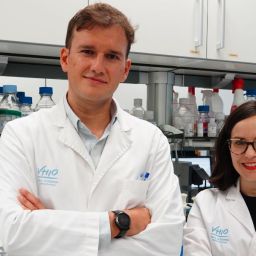
Dr. Irene Casanova, senior researcher in VHIO’s Prostate Cancer Research Group, has been awarded a Starting Grant from the European Research Council (ERC) to develop a groundbreaking liquid biopsy tool that will enable monitoring of the co-evolution of tumors and their microenvironment through an approach based on extracellular vesicles.
“With a more holistic approach, this new liquid biopsy tool will allow us to understand in parallel the evolution of the tumor, the immune system, and the microenvironment in response to treatments. The goal is not only to understand how the tumor changes in response to therapy, but also how systemic changes occur in the microenvironment and the immune system, which may be highly relevant for the design and selection of new therapeutic strategies,” explains Dr. Irene Casanova.
Prostate cancer is the second most diagnosed cancer in Spain, and the most common among men, with more than 32,000 new cases expected in 2025, according to SEOM data. Today, the vast majority are diagnosed at early stages and can be cured through surgery, radiotherapy, or brachytherapy with or without hormone therapy. However, some of these tumors eventually develop metastases, or are metastatic at diagnosis. In such cases, hormone therapy or chemotherapy may be effective, but the tumor ultimately adapts. Tools to track this adaptation can help select the best treatment for each patient at each stage of the disease.
Extracellular vesicles as tumor messengers
Extracellular vesicles are particles released by cells under normal conditions to communicate with other cells in the body. They are highly heterogeneous and can carry a wide variety of molecules, including DNA, RNA, lipids, and proteins. In cancer, vesicles released by tumor cells act like tumor scouts, seeking new sites for expansion. They play a key role in tumor progression, immune regulation, and metastasis.
In a study published in Cancer Cell, VHIO’s Prostate Cancer Research Group demonstrated that genomic material (DNA and RNA) contained in tumor-derived extracellular vesicles circulating in the bloodstream of patients with metastatic prostate cancer reflects the genomic and transcriptomic features of the tumor. This biomarker could help predict treatment response and support the development of new combination therapies to overcome resistance mechanisms.
EVOLVE Project: Following tumor and microenvironment adaptation through liquid biopsy
The EVOLVE Project, funded by the ERC, aims to create a first-in-class liquid biopsy tool to monitor the co-evolution of tumors and their microenvironment based on extracellular vesicles. “By developing this minimally invasive tool,” explains Dr. Casanova, “we will facilitate the implementation of precision medicine strategies, reaching a broader population of prostate cancer patients. The clinical development of this assay could lead to a new diagnostic tool for patient stratification, ultimately improving therapeutic decisions and outcomes.”
The project will study how metastatic prostate tumors adapt to treatments over time, with the goal of enabling early detection of resistant subclones circulating in the blood and using these information to design more effective therapies and drug combinations. This research will provide biomarkers to advance novel combinations with androgen receptor–targeted agents and recently approved immunotherapies, opening the door to new clinical trials and optimizing drug development.
“From extracellular vesicle liquid biopsies we can obtain tumor genomic information not only from circulating tumor DNA or circulating tumor cells, but also from RNA —allowing us, for the first time, to track changes in gene expression that reveal the tumor’s state in real time,” Dr. Casanova explains. Unlike free RNA in blood, which degrades quickly, RNA enclosed in vesicles remains protected and preserves its information, shedding light on the functional role of different cell types during treatment adaptation and disease progression.
While the immediate impact is expected in metastatic prostate cancer, the tumor-agnostic nature of this tool makes it applicable to other cancer types as well. Altogether, EVOLVE offers a unique opportunity to advance liquid biopsy research and develop new tools for precision oncology.
ERC Starting Grants 2025
The European Research Council (ERC) has awarded 478 early-career researchers across Europe with the 2025 Starting Grants, for a total of €761 million under Horizon Europe. These grants aim to support excellent researchers at the stage when they are starting their own independent research teams or programs.
European Commissioner for Startups, Research and Innovation, Ekaterina Zaharieva, emphasized how these grants help attract and retain top scientific talent in Europe, funding projects ranging from cancer and mental health to quantum science.
ERC President Maria Leptin noted that only 12% of proposals could be funded despite many more being excellent, calling for greater investment in science to unlock Europe’s full potential.
Overall, projects will be carried out in 25 countries, with Germany, the UK, the Netherlands and France hosting the largest number of grantees. With a record 3,928 proposals submitted, demand increased by 13% compared to last year, highlighting the high competitiveness of the call. Notably, 42% of awardees are women researchers. Each grant provides up to €1.5 million over five years, and this round is expected to create around 3,000 jobs within the new research teams.












